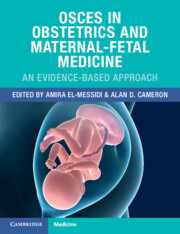Book contents
- OSCEs in Obstetrics and Maternal-Fetal Medicine
- OSCEs in Obstetrics and Maternal-Fetal Medicine
- Copyright page
- Dedication
- Contents
- Preface
- Acknowledgments
- List of Abbreviations
- Contributors
- Section 1 Obstetric Aspects of Antenatal Care
- Section 2 Labor and Delivery
- Section 3 Placental Complications
- Section 4 Neurological Disorders in Pregnancy
- Section 5 Psychiatric Disorders in Pregnancy
- Section 6 Cardiopulmonary Conditions in Pregnancy
- Section 7 Hepato-Renal and Gastrointestinal Conditions in Pregnancy
- Section 8 Connective Tissue Disorders in Pregnancy
- Section 9 Hematologic Conditions in Pregnancy
- Section 10 Endocrine Disorders in Pregnancy
- Section 11 Infectious Conditions in Pregnancy
- Chapter 59 Cytomegalovirus Infection in Pregnancy
- Chapter 60 Hepatitis B and C Virus Infections in Pregnancy
- Chapter 61 Herpes Simplex Virus Infection in Pregnancy
- Chapter 62 Human Immunodeficiency Virus Infection in Pregnancy
- Chapter 63 Parvovirus B19 Infection in Pregnancy
- Chapter 64 Rubella in Pregnancy
- Chapter 65 Syphilis in Pregnancy
- Chapter 66 Toxoplasmosis in Pregnancy
- Chapter 67 Varicella in Pregnancy
- Chapter 68 Zika Virus Infection in Pregnancy
- Chapter 69 SARS-CoV-2 Infection in Pregnancy
- Section 12 Malignant Conditions in Pregnancy
- Section 13 Miscellaneous Conditions
- Index
- References
Chapter 68 - Zika Virus Infection in Pregnancy
from Section 11 - Infectious Conditions in Pregnancy
Published online by Cambridge University Press: 23 February 2023
- OSCEs in Obstetrics and Maternal-Fetal Medicine
- OSCEs in Obstetrics and Maternal-Fetal Medicine
- Copyright page
- Dedication
- Contents
- Preface
- Acknowledgments
- List of Abbreviations
- Contributors
- Section 1 Obstetric Aspects of Antenatal Care
- Section 2 Labor and Delivery
- Section 3 Placental Complications
- Section 4 Neurological Disorders in Pregnancy
- Section 5 Psychiatric Disorders in Pregnancy
- Section 6 Cardiopulmonary Conditions in Pregnancy
- Section 7 Hepato-Renal and Gastrointestinal Conditions in Pregnancy
- Section 8 Connective Tissue Disorders in Pregnancy
- Section 9 Hematologic Conditions in Pregnancy
- Section 10 Endocrine Disorders in Pregnancy
- Section 11 Infectious Conditions in Pregnancy
- Chapter 59 Cytomegalovirus Infection in Pregnancy
- Chapter 60 Hepatitis B and C Virus Infections in Pregnancy
- Chapter 61 Herpes Simplex Virus Infection in Pregnancy
- Chapter 62 Human Immunodeficiency Virus Infection in Pregnancy
- Chapter 63 Parvovirus B19 Infection in Pregnancy
- Chapter 64 Rubella in Pregnancy
- Chapter 65 Syphilis in Pregnancy
- Chapter 66 Toxoplasmosis in Pregnancy
- Chapter 67 Varicella in Pregnancy
- Chapter 68 Zika Virus Infection in Pregnancy
- Chapter 69 SARS-CoV-2 Infection in Pregnancy
- Section 12 Malignant Conditions in Pregnancy
- Section 13 Miscellaneous Conditions
- Index
- References
Summary
A 32-year-old healthy primigravida at 13+2 weeks’ gestation is referred by her primary care provider for urgent consultation at your high-risk obstetrics clinic. Four days ago, at the first prenatal visit, she reported feeling ‘unwell’ for a few days upon returning from an urgent family trip to a country with a Zika virus outbreak. By the time of initial prenatal visit, the patient had recovered from her illness; examination was unremarkable. First-trimester dating sonography was concordant with menstrual dates, and fetal morphology appeared normal, with a low risk of aneuploidy. Results of routine prenatal investigations are normal. The patient does not work, has healthy social habits, and takes only prenatal vitamins. She has not experienced nausea, vomiting, abdominal cramps, or vaginal bleeding. In very early gestation, she required emergent medical treatment for an allergic reaction after inadvertent exposure to a neighbor’s cat.
Keywords
- Type
- Chapter
- Information
- OSCEs in Obstetrics and Maternal-Fetal MedicineAn Evidence-Based Approach, pp. 861 - 876Publisher: Cambridge University PressPrint publication year: 2023

